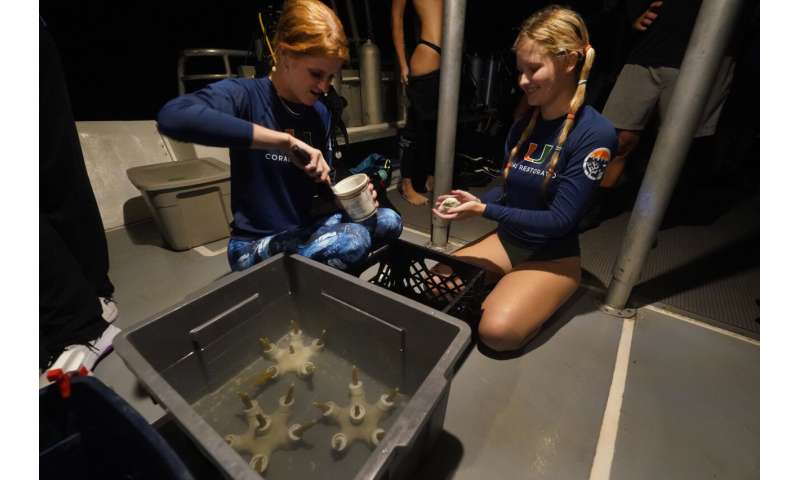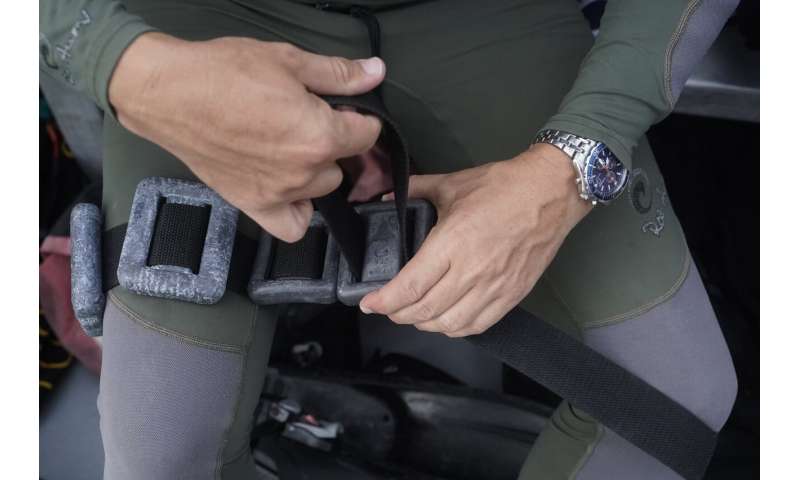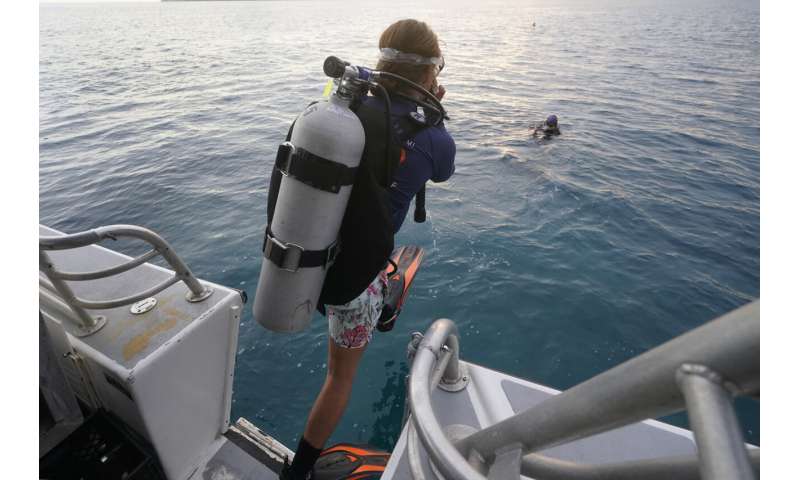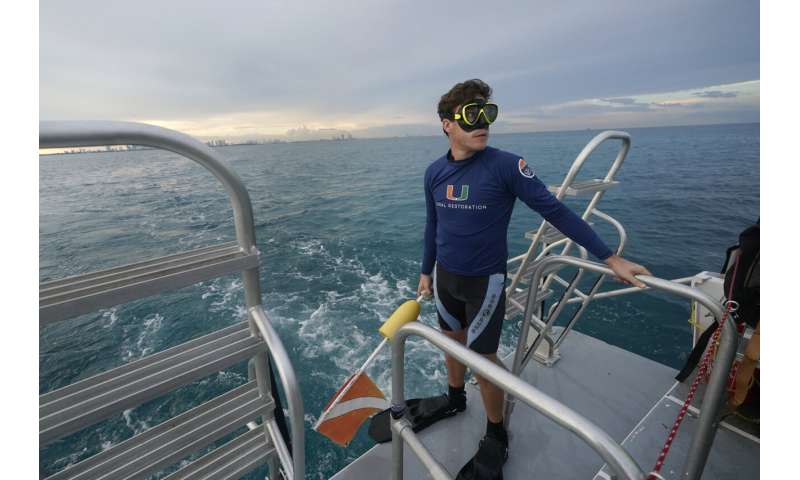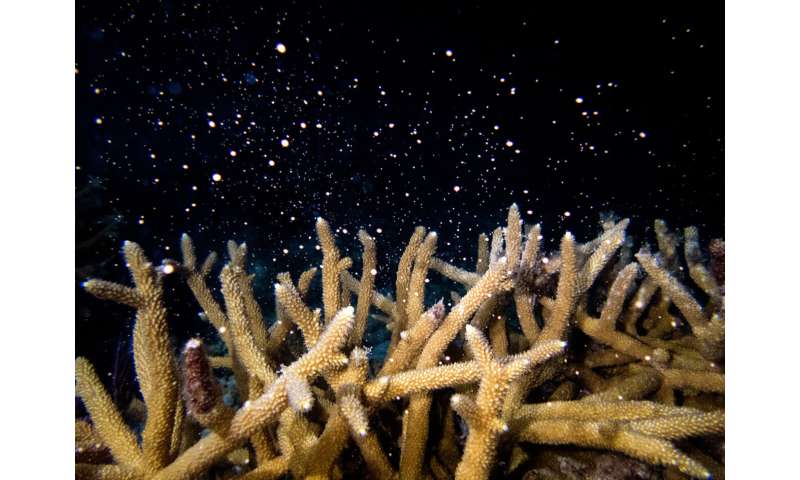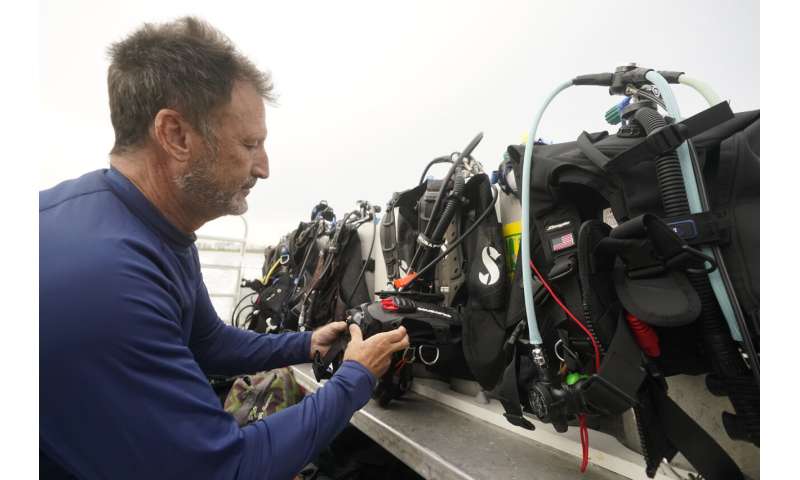Scientists seek to develop hybrid coral reef off of Miami
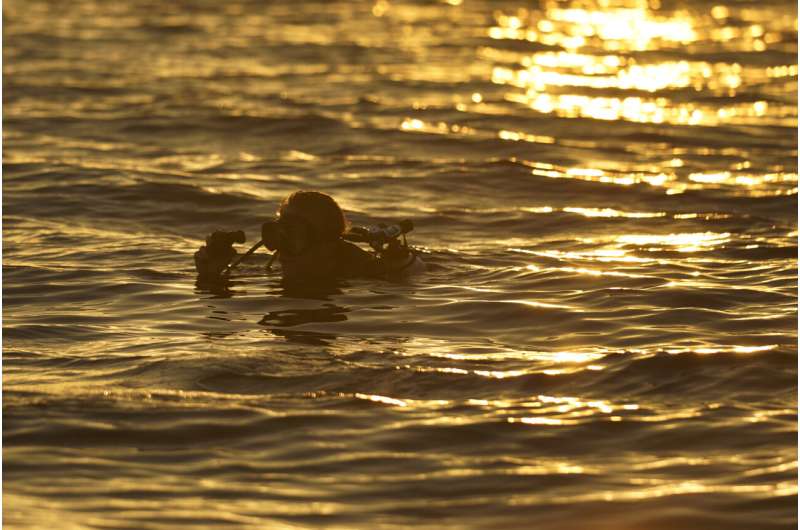
Scientists and students from the University of Miami dove into the dark waters a few miles off the shores of Miami this week as part of an effort to develop hybrid reefs.
The team from the Rosenstiel School of Marine, Atmospheric, and Earth Science was on a mission to collect eggs and sperm from spawning staghorn coral, which they hope to use to fertilize other strains of staghorn corals in a lab.
It’s all part of a $7.5 million federal grant from the U.S. Defense Advanced Research Projects Agency to help address security threats to the military and civilian infrastructure along vulnerable coastal regions in Florida and the Caribbean.
The Miami-based project seeks to protect coastal bases from damaging hurricane storm surge using hybrid reefs.
“Our mission is to develop hybrid reefs that combine the wave-protection benefits of artificial structures with the ecological benefits of coral reefs,” said Andrew Baker, a professor and director of the Coral Reef Futures Lab at the Rosenstiel School. “We will be working on next generation structural designs and concrete materials, and integrating them with novel ecological engineering approaches to help foster the growth of corals on these structures.”
-
![Scientists seek to develop hybrid coral reef off of Miami]()
Divers and snorkelers go down doing a night dive to check on coral spawning, Monday, Aug. 15, 2022, in Key Biscayne, Fla. A group of students and scientists from the University of Miami’s Rosenstiel School of Marine & Atmospheric Science were hoping to observe the coral spawn and collect their eggs and sperm, called gametes, to take back to the lab to hopefully fertilize and create new coral that will later be transplanted to help repopulate part of the Florida Reef Tract. Credit: AP Photo/Wilfredo Lee
-
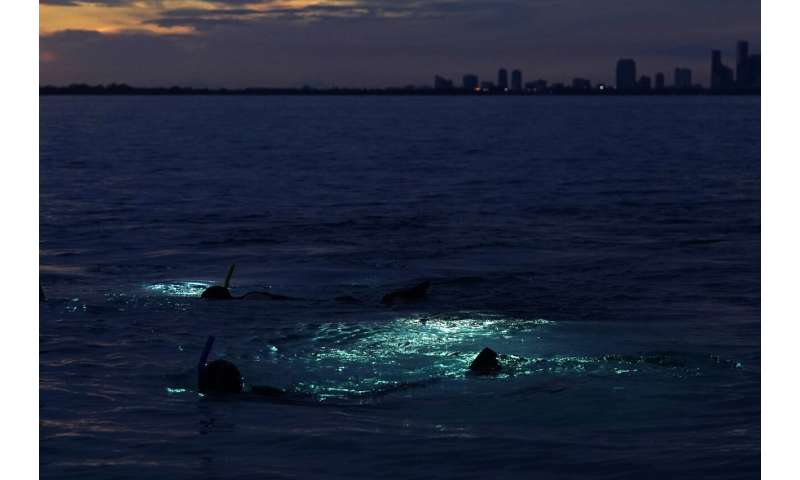
Two snorkelers follow divers with lights during a night dive to check on coral spawning, Monday, Aug. 15, 2022, in Key Biscayne, Fla. A group of students and scientists from the University of Miami’s Rosenstiel School of Marine & Atmospheric Science were hoping to observe the coral spawn and collect their eggs and sperm, called gametes, to take back to the lab to hopefully fertilize and create new coral that will later be transplanted to help repopulate part of the Florida Reef Tract. Credit: AP Photo/Wilfredo Lee
-
![Scientists seek to develop hybrid coral reef off of Miami]()
University of Miami’s Rosenstiel School of Marine & Atmospheric Science students Devon Ledbetter, 21, left, and Avery Boals, 21, mix an epoxy glue to attach pieces of coral, foreground, to a reef during a night dive to check on coral spawning, Monday, Aug. 15, 2022, in Key Biscayne, Fla. A group of students and scientists were hoping to observe the coral spawn and collect their eggs and sperm, called gametes, to take back to the lab to hopefully fertilize and create new coral that will later be transplanted to help repopulate part of the Florida Reef Tract. Credit: AP Photo/Wilfredo Lee
-
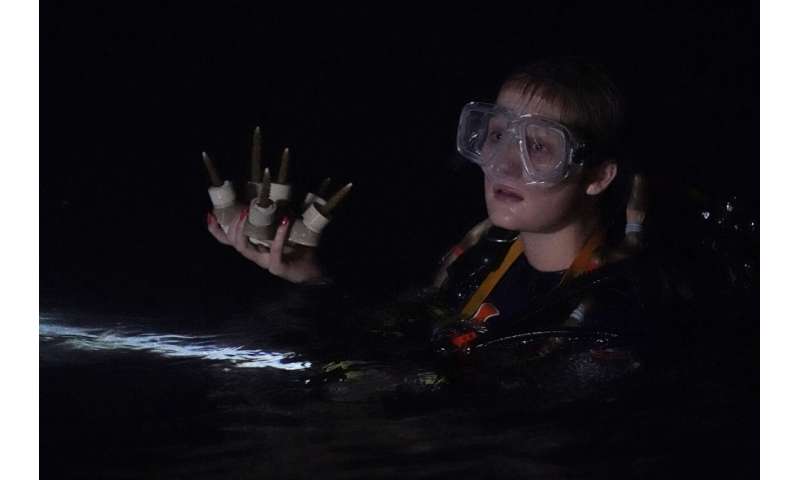
University of Miami’s Rosenstiel School of Marine & Atmospheric Science student Avery Boals, 21, waits for a fellow diver so they can attach pieces of coral to a reef during night dive to check on coral spawning, Monday, Aug. 15, 2022, in Key Biscayne, Fla. A group of students and scientists were hoping to observe the coral spawn and collect their eggs and sperm, called gametes, to take back to the lab to hopefully fertilize and create new coral that will later be transplanted to help repopulate part of the Florida Reef Tract. Credit: AP Photo/Wilfredo Lee
-
![Scientists seek to develop hybrid coral reef off of Miami]()
University of Miami’s Rosenstiel School of Marine & Atmospheric Science professor Andrew Baker puts weights on a dive belt as he prepares for a night dive to check on coral spawning, Monday, Aug. 15, 2022, in Key Biscayne, Fla. A group of students and scientists were hoping to observe the coral spawn and collect their eggs and sperm, called gametes, to take back to the lab to hopefully fertilize and create new coral that will later be transplanted to help repopulate part of the Florida Reef Tract. Credit: AP Photo/Wilfredo Lee
-
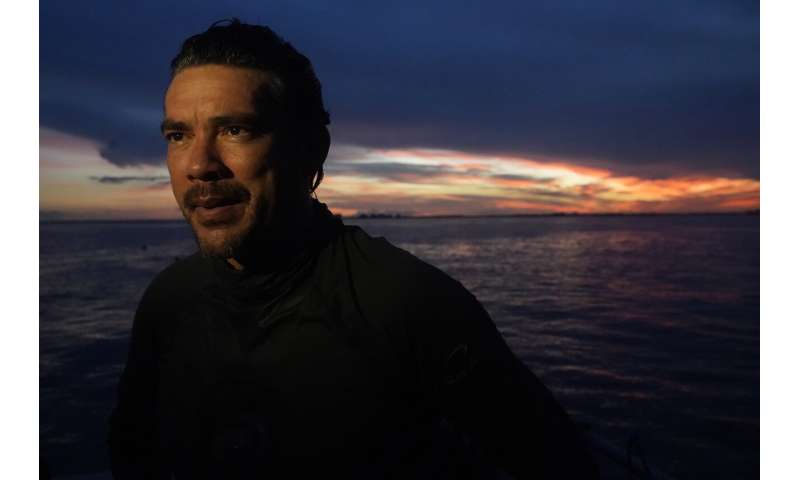
University of Miami’s Rosenstiel School of Marine & Atmospheric Science professor Andrew Baker speaks to members of the media between dives to check on coral spawning, Monday, Aug. 15, 2022, in Key Biscayne, Fla. A group of students and scientists were hoping to observe the coral spawn and collect their eggs and sperm, called gametes, to take back to the lab to hopefully fertilize and create new coral that will later be transplanted to help repopulate part of the Florida Reef Tract. Credit: AP Photo/Wilfredo Lee
-
![Scientists seek to develop hybrid coral reef off of Miami]()
University of Miami’s Rosenstiel School of Marine & Atmospheric Science student Jack Benham, 21, jumps in the water before a night dive to check on coral spawning, Monday, Aug. 15, 2022, in Key Biscayne, Fla. A group of students and scientists were hoping to observe the coral spawn and collect their eggs and sperm, called gametes, to take back to the lab to hopefully fertilize and create new coral that will later be transplanted to help repopulate part of the Florida Reef Tract. Credit: AP Photo/Wilfredo Lee
-
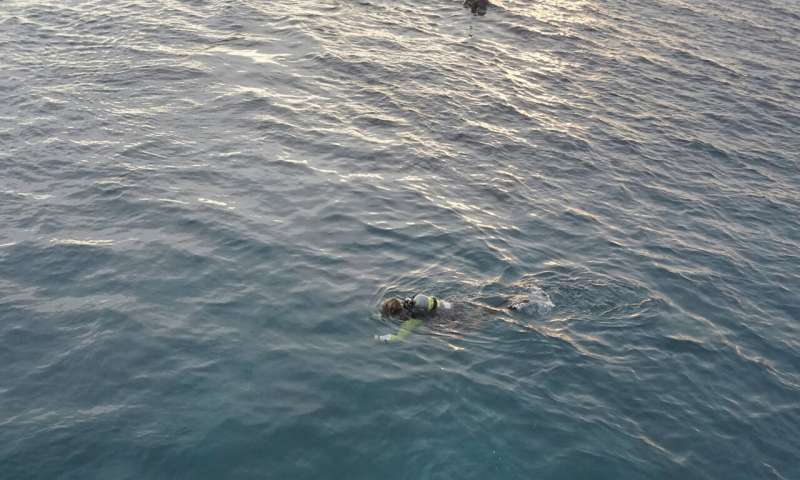
University of Miami’s Rosenstiel School of Marine & Atmospheric Science student Avery Boals, 21, foreground, leaps in the water as she and other divers prepare for a night dive to check on coral spawning, Monday, Aug. 15, 2022, in Key Biscayne, Fla. A group of students and scientists were hoping to observe the coral spawn and collect their eggs and sperm, called gametes, to take back to the lab to hopefully fertilize and create new coral that will later be transplanted to help repopulate part of the Florida Reef Tract. Credit: AP Photo/Wilfredo Lee
-
![Scientists seek to develop hybrid coral reef off of Miami]()
University of Miami’s Rosenstiel School of Marine & Atmospheric Science senior research associate Dalton Hesley prepares to mark a reef for a night dive to check on coral spawning, Monday, Aug. 15, 2022, in Key Biscayne, Fla. A group of students and scientists were hoping to observe the coral spawn and collect their eggs and sperm, called gametes, to take back to the lab to hopefully fertilize and create new coral that will later be transplanted to help repopulate part of the Florida Reef Tract. Credit: AP Photo/Wilfredo Lee
-

University of Miami’s Rosenstiel School of Marine & Atmospheric Science students Simone Nix, 22, left, Grace Benyon, 22, center, and Jack Benham, 21, prepare their dive gear before a night dive to check on coral spawning, Monday, Aug. 15, 2022, in Key Biscayne, Fla. A group of students and scientists were hoping to observe the coral spawn and collect their eggs and sperm, called gametes, to take back to the lab to hopefully fertilize and create new coral that will later be transplanted to help repopulate part of the Florida Reef Tract, but the coral did not cooperate that night. Credit: AP Photo/Wilfredo Lee
-
![Scientists seek to develop hybrid coral reef off of Miami]()
In this photo provided by the University of Miami’s Rosenstiel School of Marine & Atmospheric Science staghorn coral spawns, Sunday, Aug. 14, 2022, near North Key Largo, Fla. Scientists and students from the University of Miami dove into the dark waters a few miles off the shores of Miami this week as part of an effort to develop hybrid reefs. The team from the Rosenstiel School of Marine, Atmospheric, and Earth Science was on a mission to collect eggs and sperm from spawning staghorn coral, which they hope to use to fertilize other strains of staghorn corals in a lab. Credit: Liv Williamson/University of Miami Rosenstiel School of Marine Atmospheric and Earth Science via AP
-

University of Miami’s Rosenstiel School of Marine & Atmospheric Science senior research associates Dalton Hesley, left, and Liv Williamson prepare for a night dive to check on coral spawning, Monday, Aug. 15, 2022, in Key Biscayne, Fla. A group of students and scientists were hoping to observe the coral spawn and collect their eggs and sperm, called gametes, to take back to the lab to hopefully fertilize and create new coral that will later be transplanted to help repopulate part of the Florida Reef Tract. Credit: AP Photo/Wilfredo Lee
-
![Scientists seek to develop hybrid coral reef off of Miami]()
University of Miami’s Rosenstiel School of Marine & Atmospheric Science Associate Professor Diego Lirman prepares his dive gear before a night dive to check on coral spawning, Monday, Aug. 15, 2022, in Key Biscayne, Fla. A group of students and scientists were hoping to observe the coral spawn and collect their eggs and sperm, called gametes, to take back to the lab to hopefully fertilize and create new coral that will later be transplanted to help repopulate part of the Florida Reef Tract. Credit: AP Photo/Wilfredo Lee
-
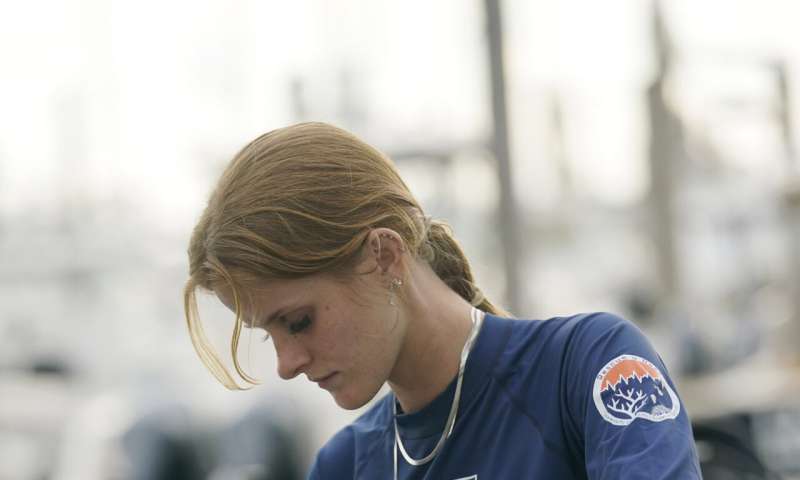
University of Miami’s Rosenstiel School of Marine & Atmospheric Science student Devon Ledbetter, 21, prepares her dive gear before a night dive to check on coral spawning, Monday, Aug. 15, 2022, in Key Biscayne, Fla. A group students and scientists were hoping to observe the coral spawn and collect their eggs and sperm, called gametes, to take back to the lab to hopefully fertilize and create new coral that will later be transplanted to help repopulate part of the Florida Reef Tract. Credit: AP Photo/Wilfredo Lee
They will also be testing new adaptive biology approaches to produce corals that are faster-growing and more resilient to a warming climate, he said.
Coral spawns just a few nights every year, depending on water temperature and lunar cycle, coral colonies simultaneously release their eggs and sperm into the water column, which fertilize one another to create baby coral.
Cultivating super corals alone is unlikely to protect coral reefs from climate change
© 2022 The Associated Press. All rights reserved. This material may not be published, broadcast, rewritten or redistributed without permission.
Citation:
Scientists seek to develop hybrid coral reef off of Miami (2022, August 17)
retrieved 17 August 2022
from https://phys.org/news/2022-08-scientists-hybrid-coral-reef-miami.html
This document is subject to copyright. Apart from any fair dealing for the purpose of private study or research, no
part may be reproduced without the written permission. The content is provided for information purposes only.
For all the latest Science News Click Here
For the latest news and updates, follow us on Google News.



